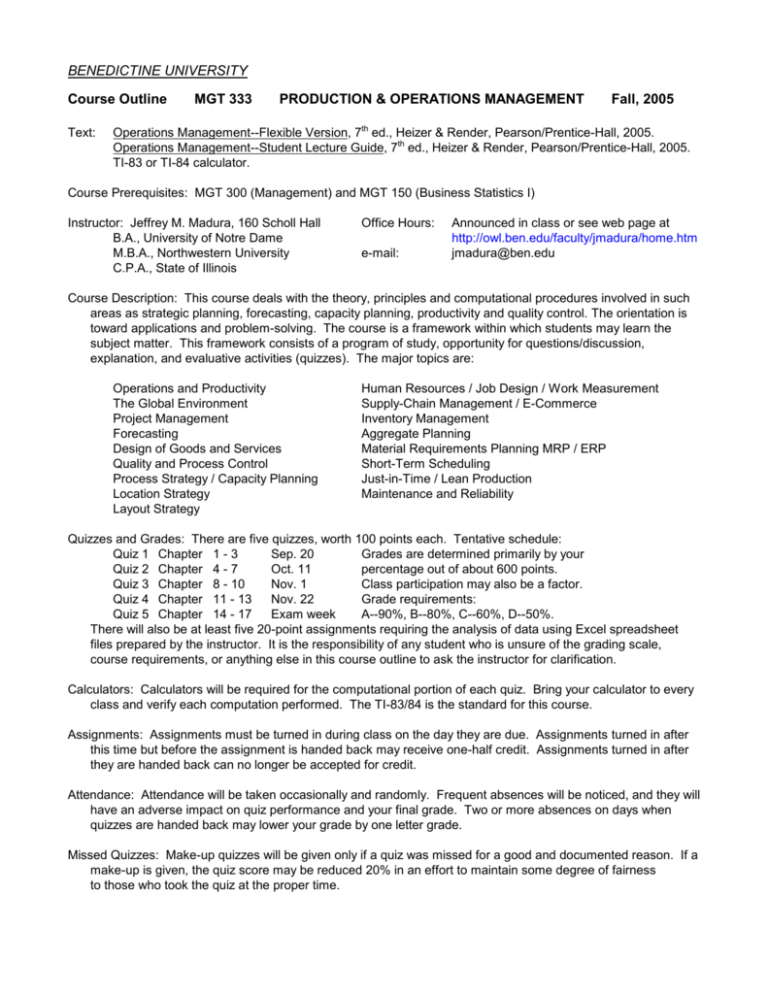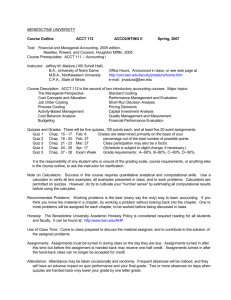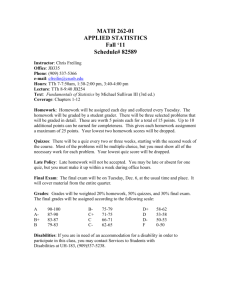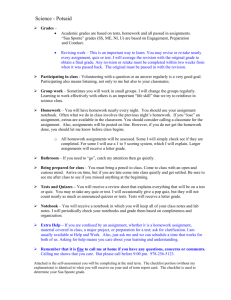
BENEDICTINE UNIVERSITY
Course Outline
Text:
MGT 333
PRODUCTION & OPERATIONS MANAGEMENT
Fall, 2005
Operations Management--Flexible Version, 7th ed., Heizer & Render, Pearson/Prentice-Hall, 2005.
Operations Management--Student Lecture Guide, 7th ed., Heizer & Render, Pearson/Prentice-Hall, 2005.
TI-83 or TI-84 calculator.
Course Prerequisites: MGT 300 (Management) and MGT 150 (Business Statistics I)
Instructor: Jeffrey M. Madura, 160 Scholl Hall
B.A., University of Notre Dame
M.B.A., Northwestern University
C.P.A., State of Illinois
Office Hours:
e-mail:
Announced in class or see web page at
http://owl.ben.edu/faculty/jmadura/home.htm
jmadura@ben.edu
Course Description: This course deals with the theory, principles and computational procedures involved in such
areas as strategic planning, forecasting, capacity planning, productivity and quality control. The orientation is
toward applications and problem-solving. The course is a framework within which students may learn the
subject matter. This framework consists of a program of study, opportunity for questions/discussion,
explanation, and evaluative activities (quizzes). The major topics are:
Operations and Productivity
The Global Environment
Project Management
Forecasting
Design of Goods and Services
Quality and Process Control
Process Strategy / Capacity Planning
Location Strategy
Layout Strategy
Human Resources / Job Design / Work Measurement
Supply-Chain Management / E-Commerce
Inventory Management
Aggregate Planning
Material Requirements Planning MRP / ERP
Short-Term Scheduling
Just-in-Time / Lean Production
Maintenance and Reliability
Quizzes and Grades: There are five quizzes, worth 100 points each. Tentative schedule:
Quiz 1 Chapter 1 - 3
Sep. 20
Grades are determined primarily by your
Quiz 2 Chapter 4 - 7
Oct. 11
percentage out of about 600 points.
Quiz 3 Chapter 8 - 10
Nov. 1
Class participation may also be a factor.
Quiz 4 Chapter 11 - 13
Nov. 22
Grade requirements:
Quiz 5 Chapter 14 - 17
Exam week
A--90%, B--80%, C--60%, D--50%.
There will also be at least five 20-point assignments requiring the analysis of data using Excel spreadsheet
files prepared by the instructor. It is the responsibility of any student who is unsure of the grading scale,
course requirements, or anything else in this course outline to ask the instructor for clarification.
Calculators: Calculators will be required for the computational portion of each quiz. Bring your calculator to every
class and verify each computation performed. The TI-83/84 is the standard for this course.
Assignments: Assignments must be turned in during class on the day they are due. Assignments turned in after
this time but before the assignment is handed back may receive one-half credit. Assignments turned in after
they are handed back can no longer be accepted for credit.
Attendance: Attendance will be taken occasionally and randomly. Frequent absences will be noticed, and they will
have an adverse impact on quiz performance and your final grade. Two or more absences on days when
quizzes are handed back may lower your grade by one letter grade.
Missed Quizzes: Make-up quizzes will be given only if a quiz was missed for a good and documented reason. If a
make-up is given, the quiz score may be reduced 20% in an effort to maintain some degree of fairness
to those who took the quiz at the proper time.
Honesty: The search for truth and the dissemination of knowledge are the central missions of a university.
Benedictine University pursues these missions in an environment guided by our Roman Catholic tradition and our
Benedictine heritage. Integrity and honesty are therefore expected of all members of the University community,
including students, faculty members, administration, and staff. Actions such as cheating, plagiarism, collusion,
fabrication, forgery, falsification, destruction, multiple submission, solicitation, and misrepresentation, are violations
of these expectations and constitute unacceptable behavior in the University community. The penalties for such
actions can range from a private verbal warning, all the way to expulsion from the University. The University’s
Academic Honesty Policy is available at http:/www.ben.edu/AHP and students are expected to read it.
Disability Statement: If you have a documented learning, psychological, or physical disability, you may be eligible
for reasonable academic accommodations or services. To request accommodations or services, please
contact Tina Sonderby in the Academic Resource Center, 249 Kindlon Hall, 630-829-6512. All students are
expected to fulfill essential course requirements. The University will not waive any essential skill or
requirement of a course or degree program.
Technology Requirements: Students are expected to be familiar with software such as Microsoft Excel and Word.
They will also be expected to access the instructor’s web site often to obtain assignments and possible course
updates. With respect to Excel, students will not generally be expected to create original spreadsheets, but
they will be expected to be able to control formats, especially in printing. Other specialized software may be
used in the course.
Constructive comments about any aspect of this course are always welcome.
COURSE PHILOSOPHY -- PRODUCTION & OPERATIONS MANAGEMENT
In an article in the Chronicle of Higher Education, Sharon Rubin, assistant dean at the University of Maryland,
states that all course syllabi, in addition to providing the basic information on texts, topics, schedule, etc., should
answer certain questions. The instructor of this course would like to share these questions with you, and provide
some answers.
1. WHY SHOULD A STUDENT WANT TO TAKE THIS COURSE?
Every organization, whether large or small, whether for-profit or not-for profit, whether providing a product or a
service, engages in activities that may be called “operations.” Managing these activities so that they are
conducted with maximum efficiency and effectiveness is often essential to the success of the organization.
Every business student should have some knowledge of the principles that govern this area of management.
2. HOW DOES THIS COURSE FIT INTO THE "GENERAL EDUCATION" PROGRAM?
The study of this subject can promote clear and careful thinking, enhance problem-solving skills, and
strengthen one's ability to avoid premature conclusions. These are traits of the educated person, and are the
mental qualities essential for "knowledge workers" in modern society.
3. WHAT ARE THE OBJECTIVES OF THE COURSE?
The most important objective is the development of your ability to learn this kind of material on your own, and
to continue learning more about the subject after the course is over. Continuous and independent learning is
an important activity of every successful person. In connection with the objective of independent learning, the
instructor will expect students to study and learn certain topics in the course without formal discussion of them
in class. Questions on these topics, of course, are always welcomed and encouraged.
With respect to specific objectives, they are: that students learn the terminology, theory, principles, and
computational procedures related to production and operations management; and the careful cultivation of the
logical processes involved. This will enable students to understand the subject and communicate its ideas
using generally-accepted terminology.
Another important objective is that students become aware of the limitations of various procedures and
analyses. This is particularly important since most students in this course will be consumers rather than
providers of operations information and conclusions. Estimates and forecasts, for example, are generally
regarded with too much faith, and relied upon to a degree not warranted in light of their inherent limitations.
4. WHAT MUST STUDENTS DO TO SUCCEED IN THIS COURSE?
Your activities in this course should include: reading and studying the relevant sections of the text; attending
class and taking notes; rewriting, reviewing, and studying your notes; working the recommended exercises in
the text; practicing and experimenting with various spreadsheet files supplied by the instructor; asking and
answering questions in class; spending time just thinking about the procedures and their underlying logic;
forming a study group with other students to review notes on terminology and concepts, and to practice
problem-solving skills; and taking the quizzes.
These activities should help you to further develop your abilities to read, listen, record, and organize important
information; and to communicate, analyze, compute, and learn independently the subject matter.
In order to do well, students must recognize a basic difference between courses like operations management
and courses like history, philosophy, management or organizational strategy. In the latter type, the emphasis
is often on general ideas in broad contexts, with grades based on essay exams and term papers in which
students have considerable latitude to choose what they are going to discuss. The cogent expression and
defense of well-reasoned opinion are highly valued. Students with good verbal, logical and writing skills often
excel in this type of course. This course, on the other hand, is skills-oriented, requiring extremely precise
knowledge of concepts, terminology, and computational procedures. Verbal skills are still important, but now
quantitative logic and computational competence are also critical. Grades are based on knowledge of
terminology and concepts, and even more on the ability to get the right answers to problems.
Regarding study strategy, it is extremely important for most students to read about this subject every day, to
think about it every day, and perhaps do a problem or exercise every day. The most common error is to
neglect the material until shortly before a quiz. For most students, many of the concepts in this course are
new and strange, and there will be many places where they are stopped cold: "What?" "I just don't get this!"
Then there is no time left to cultivate the understanding of new concepts and to refine the computational
procedures. Anyone can learn this material, but most cannot do it overnight.
5. WHAT ARE THE PREREQUISITES FOR THE COURSE?
The primary prerequisite is a logical mind. This course is computational, but it is not a "math" course.
Mathematical theorems are not derived or proven; the need to solve equations is very rare. The emphasis is
on concrete applications rather than abstract theory. Some students with good math backgrounds have done
poorly, while others with little or no math experience have done very well.
6. OF WHAT IMPORTANCE IS CLASS PARTICIPATION?
In this course, class participation means frequently asking relevant questions and supplying answers (right or
wrong) to the instructor's and colleagues' questions as problems and examples are worked out and discussed.
These behaviors are evidence of active involvement with the material and will result in better learning and an
automatic positive effect on your grade. In grade border-line cases, a history of active participation will enable
the instructor to award the higher grade to the deserving student.
7. WILL STUDENTS BE GIVEN ALTERNATIVE WAYS TO ACHIEVE SUCCESS, BASED ON DIFFERENT
LEARNING STYLES?
Different learning styles do exist. Some prefer a deductive method (deriving specific knowledge from general
principles), while others tend to prefer an inductive method (deriving the generalities from examples). The
inductive learners may need to work a number of problems before seeing the patterns that are present. The
deductive learners may never need to work a problem--they will know instinctively what to do. Some will not
like the book, and will learn primarily from the class presentations and discussions, while others will learn
mostly from the book and will find class time to be of lesser importance.
But the intended outcomes are the same for all--those in number 3 above.
8. WHAT IS THE PURPOSE OF THE ASSIGNMENTS?
Problems from the text are suggested, for the purpose of providing practice in analyzing what must be done,
and in performing the required computations. Even though computer software is available to perform
calculations, students can gain insight into the logical structure of a sequence of computational steps if they go
through them several times by hand (i.e. using simple calculators).
Computer assignments using instructor-supplied spreadsheet files will require students to become more
familiar with spreadsheet software that they probably are or will be using in connection with their work. More
importantly, the spreadsheets allow students to experiment with data in order to investigate the quantitative
relationships involved. Such experimentation would be too tedious and time-consuming for manual or even
calculator computation.
9. WHAT WILL THE TESTS TEST? -- MEMORY? UNDERSTANDING? ABILITY TO SYNTHESIZE? TO
PRESENT EVIDENCE LOGICALLY? TO APPLY KNOWLEDGE IN A NEW CONTEXT?
The tests will test your ability to recognize and use terminology correctly, and they will test your understanding
of the logic and principles underlying various computational procedures. In addition, you will have to
demonstrate your ability to solve problems similar to those discussed in class, sometimes using computer
spreadsheet files.
There is a place for memorization in learning. It is not a substitute for comprehension, but it is better than
getting something wrong on a quiz that you were expected to know. As with prayers among small children,
memorization is often a first step, eventually followed by understanding. But if the memorization (of
terminology, for example) is not done, it is less likely that the comprehension will ever occur.
10. WHY HAS THIS PARTICULAR TEXT BEEN CHOSEN?
The Heizer and Render text is one of the most widely adopted operations management books. It has gone
through seven editions, and its popularity remains high. It is relatively easy to read, and its exercise material is
excellent.
11. WHAT IS THE RELATIONSHIP BETWEEN KNOWLEDGE LEVEL AND GRADES?
Consider this hypothetical but realistic situation.
Knowledge
100%
90%
80%
70%
60%
50%
40%
30%
20%
10%
Percentage Grade
Course A
Course B
100%
100%
90%
81%
80%
64%
70%
49%
60%
36%
50%
25%
40%
16%
30%
9%
20%
4%
10%
1%
Course A might be like philosophy, history, or management, where reward is more-or-less proportional to
knowledge level. Course B might be like this course, or other skills courses, where small deficiencies in
knowledge can have disastrous effects on results. Overstudying is the best strategy for coping with this, with
the dual payoffs of higher grades and, more importantly, greater knowledge.







